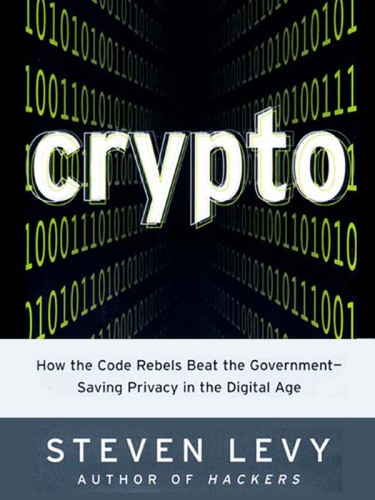
Crypto
How the Code Rebels Beat the Government—Saving Privacy in the Digital Age
کتاب های مرتبط
- اطلاعات
- نقد و بررسی
- دیدگاه کاربران
نقد و بررسی

January 1, 2001
The author of the 1994 sleeper Hackers reveals how a group of men developed methods for encrypting digital transmissions for use in the private sector. As the digital age was dawning in the late 1970s, a major stumbling block to delivering information and conducting transactions via high-speed networks was the lack of security from outside parties who might wish to intercept the data (even though the National Security Agency had acres of computers dedicated to protecting government secrets and even more designed to decode other countries' messages). Widely available systems only began to emerge after a range of free thinkers, including such crypto legends as Whit Diffie and Marty Hellman, began to devote their considerable mind power to the issue. After a slow start, Levy's story steadily builds momentum as the crypto pioneers do battle with the NSA, look for ways to commercialize their discoveries and fight for the federal government's approval of the strongest encryption methods. The chief technology writer for Newsweek, Levy locates the heart of the matter in the struggle to balance the need for the most effective encryption possible with the government's need to decode messages that might endanger national security--a struggle in which privacy, so far, has prevailed. Agent, Dominick Abel . (Jan. 8) Forecast: Levy's reputation grows with each book, and publicity that links this title to his bestselling Hackers will ensure strong sales. The title is backed by a six-city author tour and national radio satellite tour. The major promo campaign online, where Levy is minor royalty, may be most effective, but the book's biggest boost will come from the planned excerpt in Newsweek.

September 15, 2000
What happens to privacy when computer geeks and big business battle the government for free access to information? From the author of Hackers.
Copyright 2000 Library Journal, LLC Used with permission.

January 1, 2001
The government monopoly of sophisticated codes is no more, dissolved by the invention of "public key" cryptography, and Levy here recounts how a handful of mathematicians and computer scientists did it. Simon Singh succinctly described public key's principal creators and operating principles in " The Code Book "(1999). Levy emphasizes the story's business aspects and patent disputes among the inventors. In addition, he folds in incidents involving emissaries from the secret world of the National Security Agency, who subsequently helped to break the agency's lock on high-level codes. Profiling names now legendary in cryptography--such as Whit Diffie, Phil Zimmerman, or a trio whose acronymic RSA algorithm makes secure e-commerce possible--Levy lucidly limns their counterintuitive thinking about codes (especially the idea that keys, based on gigantic prime numbers, be exchanged in the open for all to see). Culminating with reportage on their efforts to commercialize and export public-key crypto, which the NSA successfully lobbied the Clinton administration to limit, Levy's history is a fascinating intersection of people, privacy, and power.(Reprinted with permission of Booklist, copyright 2001, American Library Association.)

























دیدگاه کاربران